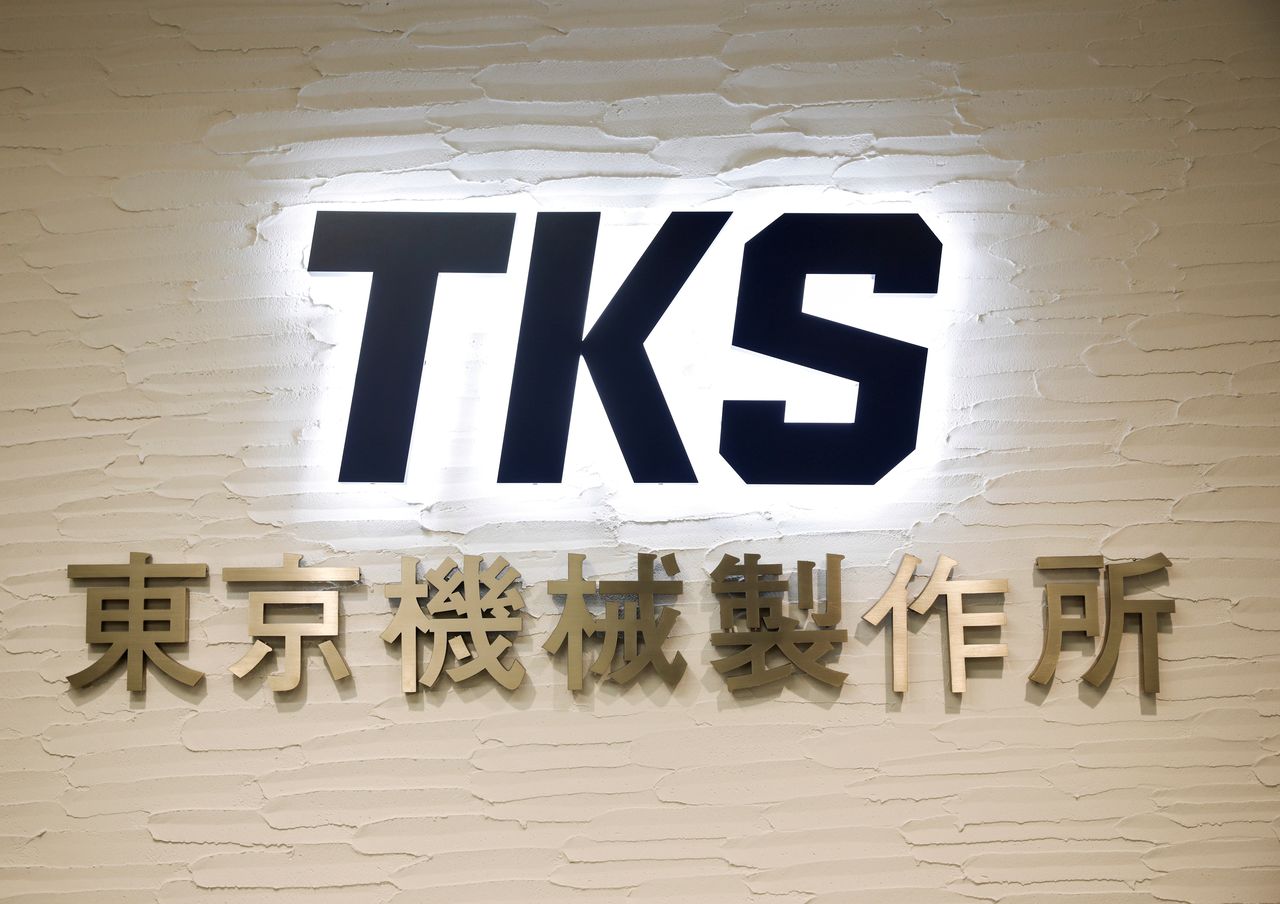Analysis: Japan's controversial cross-shareholdings get second wind after court battle
Newsfrom Japan
- English
- 日本語
- 简体字
- 繁體字
- Français
- Español
- العربية
- Русский

FILE PHOTO: The logo of Tokyo Kikai Seisakusho Ltd. is displayed at the company headquarters office in Tokyo, Japan October 21, 2021. REUTERS/Issei Kato
By Makiko Yamazaki
TOKYO (Reuters) - A simmering Tokyo legal battle could embolden Japan Inc to hang on to cross-shareholdings as a defence against hostile takeovers, a setback for corporate governance reforms championed under former Prime Minister Shinzo Abe.
The development threatens to sow uncertainty at a time when investors are trying to gauge new premier Fumio Kishida's commitment to pro-market reform and attracting international investors.
The Tokyo District court last month ruled manufacturer Tokyo Kikai Seisakusho could issue a poison pill, rejecting a request for an injunction from top shareholder Asia Development Capital (ADC), which sought to block the move after being excluded from voting on it.
In the absence of ADC, other shareholders approved the poison pill. Owned by Malaysian businessman Anselm Wong, Tokyo-listed ADC built up most of its 40% stake in a matter of weeks, enough to give it veto rights over important board decisions.
Tokyo Kikai's other shareholders include its business partners, reflecting the common practice in Japan where companies take stakes in partners to cement relationships.
"Cross-shareholdings and special shareholders of various kinds continue to insulate management from having to serve the interests of general shareholders," said Tokyo-based corporate lawyer Stephen Givens.
Tokyo Kikai said ADC was excluded from voting because it was an "interested party", adding members of company management were also excluded.
But ADC says the fact shareholders with ties to Tokyo Kikai were allowed to vote - including insurer Sompo Japan, Mizuho Bank and Sumitomo Mitsui Banking Corp - shows the "interested party" definition was arbitrarily applied.
"Interested parties, if broadly interpreted, could also include shareholders with cross-shareholding or business interests," said Kazunori Suzuki of Waseda Business School.
On Tuesday, the Tokyo High Court dismissed ADC's latest appeal. The fund has appealed to the supreme court.
Sompo Japan said it holds Tokyo Kikai shares for strategic purposes. It said its policy is to contribute to the sustainable growth of investee companies, and that it exercises its voting rights appropriately, taking into consideration corporate governance and compliance.
Mizuho and SMBC declined to comment on individual shareholdings. Both banks said they vote appropriately at investee firms. Mizuho said its voting took into account governance and long-term value.
'COERCIVE' BIDS, OPAQUE HOLDING
To be sure, some economists such as Cambridge University's Ha Joon Chang say cross-shareholdings - like the presence of workers on company supervisory boards in Germany - can serve as a check on the influence of short-term investors who may neglect investment and over-emphasise dividends and buybacks.
Veteran M&A lawyer Yo Ota, who is advising Tokyo Kikai, said it was reasonable to exclude ADC to give other shareholders a say on the acquisition, especially as they were adversely affected by what he said was the "coercive" nature of ADC's bid - when an investor feels compelled to sell or risk having their interests damaged.
Like any other investor, corporate shareholders could be hurt by the acquisition, Ota said.
ADC said corporate shareholders would not be subject to coercion because they own stakes for non-investment purposes.
While Japanese firms have been slowly unwinding their cross-shareholdings in the last two decades, a third of Japan's $6.6 trillion stock market is still owned by cross-shareholders.
That's down by half since the late 1990s, according to Nomura Institute of Capital Markets Research.
Under Japan's stewardship code, only institutional investors are forced to disclose voting records at shareholder meetings.
In a recent survey of nearly 1,600 firms by Japanese commercial law journal "Shoji Homu", over 60% of the respondents said such allied shareholders account for 40% or more of their registers.
Japan's governance code now requires companies to annually assess whether the purpose of a cross-shareholding is appropriate.
Companies that have been targets of successful hostile acquisitions in the past year or two have lacked cross-shareholders to protect them, said lawyer Givens.
Several bankers said it would be impossible to end the practice because companies worry about the price impact from a share sale and the prospect of allied shareholders being replaced by activists.
"It's a business practice that you don't see in developed Western countries where the environment forces companies to listen to the opinions of their shareholders," said Ken Hokugo, director of Japan's Pension Fund Association.
"The number of shares and amount of shareholder capital that companies spend on this shows the inefficiency and unattractiveness of the Japanese market."
(Reporting by Makiko Yamazaki; Editing by David Dolan and Lincoln Feast.)
(c) Copyright Thomson Reuters 2021. Click For Restrictions -
https://agency.reuters.com/en/copyright.html